Introduction to Christianity with Luke
Chapter 6
Hi, welcome to my Introduction to Christianity with Luke. I’m Brent Clark. In chapter six, we learn about:
- Jesus having authority over the Sabbath
- Jesus appointing the apostles and teaching them
- Jewish sects around Jesus’ time
- Why there’s so many different churches
 Luke 6:1-5: Jesus has authority over the Sabbath
Luke 6:1-5: Jesus has authority over the Sabbath

The Pharisees were the ultimate legalists. They’d interpreted every law to the nth degree so that they wouldn’t offend God by accident. Through this, they offended God by turning the interpretation of his laws into an idol that was more important than loving God and those around us. This led to them killing Jesus who came to fulfill their law.
In the ten commandments that God gave to Israel, the fourth is to keep the seventh day as a holy day of rest from regular work – the Sabbath. The Pharisees made up an extensive interpretation of what is work. Irrigating one’s fields is obviously work, but the pharisees determined that spitting on the dirt is irrigating, and therefore illegal on the sabbath. Harvesting crops is obviously work. The disciples picked heads of grain as they walked through the fields as was a legal custom. It would only be considered theft if they were to collect enough to take away for later, which would also be work. Picking an apple from a tree is no more work than picking up an apple from the table.
Rather than condemn their legalism, Jesus chose to point out that God allows exceptions to the law. The Bible teaches that the law is only good for showing how we fail to be good enough and why we can only be made holy by Jesus’ gift.
 Luke 6:6-11: Jesus heals on the Sabbath
Luke 6:6-11: Jesus heals on the Sabbath

The pharisees observed that Jesus’ job was healing people. So, they considered it illegal for Jesus to heal on the Sabbath. They’d totally missed the point of the law is to preserve life, and the day of rest is provided to bring health. They were fine with Priests performing prescribed rituals, but since Jesus was following the Holy Spirit’s leading, they sought to control him. In following their gross extrapolation of the law, they preferred to leave a man to suffer than to allow God’s love to be shown.
 Luke 6:12-16: Jesus appoints 12 apostles
Luke 6:12-16: Jesus appoints 12 apostles
It seems they weren’t very inventive with names back then, with two Simons, Jameses, and Judases. These names derive from Israel’s forefathers: Simeon son of Jacob, Jacob (Israel) (remember Jack is a nickname for James), and Jude (son of Jacob). There were also many Jesuses, named after Moses’ servant and successor, Joshua.
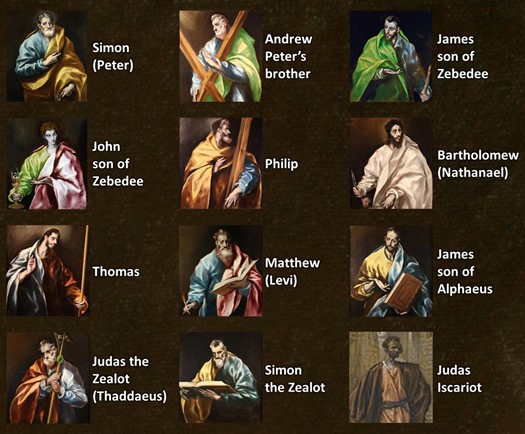
While Jesus appoints 12 apostles here, others are named apostles in the New Testament, such as Mathias who replaced Judas, and Paul who wrote most of the letters in the New Testament.
 Luke 6:17-19: Many are cured
Luke 6:17-19: Many are cured
They certainly went a long way to follow Jesus, particularly considering that they had to walk everywhere.

 Luke 6:20-26: Jesus teaches the disciples
Luke 6:20-26: Jesus teaches the disciples

This teaching, called the Beatitudes (what you should be), is the most popular teaching, that people like to extract out of Christianity for a feel-good philosophy, but avoid the spiritual trappings and eternal consequences. It sounds like a great set of rules to live by, which many form into their own new religion.
Matthew 5-7 is the more popular account of this “Sermon on the mount”.
Essentially the message is to give up your human rights for the purpose of the Kingdom of Heaven. Those who follow Jesus will be mistreated by those outside the church and those within. It’s not an easy road, but you will be rewarded.
 Luke 6:27-36: Love your enemies
Luke 6:27-36: Love your enemies

Continuing from this, put up with mistreatment, repaying them with kindness. It’s ideas like this that lead missionary widows to serve the tribe that killed their husbands, to lead them to Christ. Steve Saint grew up with the tribe who killed his father and became best friends with his father killer. This is a total counter-reaction to our nature.
 Luke 6:37-42: Stop judging
Luke 6:37-42: Stop judging
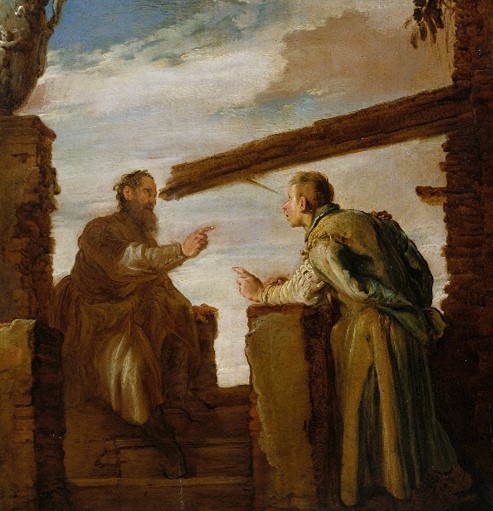
Judging is a peculiar topic. Jesus teaches us here to not judge, but then in other places, we are to apply judgement e.g., to recognize evil and not be a part of it. I think it would be clearer to say, “don’t treat others with prejudice” or “don’t discriminate”. If you treat others with prejudice, you’ll be reinforcing a cycle of prejudice that will come back to you. Jesus is the judge. He earned that right when we was crucified for our sins although he lived a perfect life. Only he has the right to condemn. The law of Moses includes capital punishment, but the problem is that we’re all imperfect. It’s easy to see the fault in others and ignore our own faults. If we condemn others because of their imperfection, we’re setting a precedent for our own condemnation.
 Luke 6:43-45: A tree known by its fruit
Luke 6:43-45: A tree known by its fruit
Often people judge other ministries. Something to keep in mind is “What is their fruit?” or “What are they building?” This question must be applied to the judge as well as the accused. Likewise, someone may appear as a saint, but they may lead people away from holiness and faith in the Bible. This is their fruit. Such people should be avoided.


 Luke 6:46-49: Build on the rock
Luke 6:46-49: Build on the rock
Those who build their life on Jesus will have a firm foundation when life’s troubles come. Others may seem to prosper, but when life gets difficult, they lack the support and their life crashes around them. This is particularly evident around divorce.


 Jewish sects at the time of Jesus
Jewish sects at the time of Jesus
From the Bible, we’re familiar with the Pharisees and Sadducees. From the historian Josephus, we also know of the Essenes, who preserved the Dead Sea Scrolls. One of Jesus’ disciples was called Simon the Zealot.
It’s normal for people to split into factions. Under a religion, these factions are called sects.
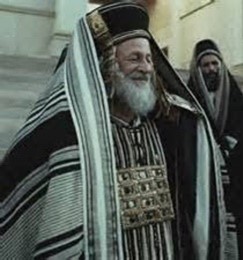
The Pharisees began around 200BC, the Maccabees overthrew the Greek occupation as celebrated at Hannukah. Priests appointed themselves as rulers and forced everyone to follow laws intended only for the priests. They even forced gentiles to be circumcised and become Jews. Modern Judaism generally derives from the Pharisees. What the Bible calls the traditions of the elders, modern Jews call Oral Torah, claiming this to be an oral law handed down from Moses.
The Sadducees arose who didn’t believe in an afterlife and taught political compromise with the dominant Greek influences to avoid trouble. These two apostatized into civil war to kill off the other heretics. They independently requested the Romans to come in to bring order to their chaos.
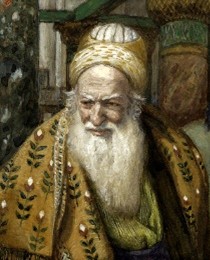

The Herodians are often mentioned in the Bible, they followed Greek customs, and wanted independence from Rome under King Herod, who was actually a foreigner.
The Essenes formed around the lawful Priests who descend from Zadok of King David’s time. With the civil war, and when usurpers bought the political power of the priesthood, they fled to the desert of Qumran near the Dead Sea and took their library with them. Sometimes when the Bible refers to the scribes, it may be talking of the Essenes. John the Baptist and his disciples Peter and Andrew who became Jesus’ apostles, were probably Essenes.
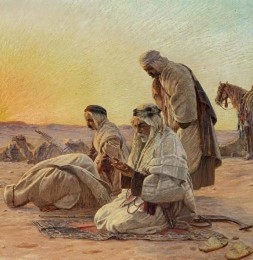
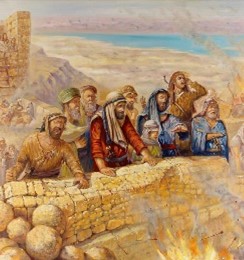
The Zealots were very much like Pharisees but were freedom fighters against the Roman occupation. They incited various rebellions against the Romans. They are most famous for the last stand at Masada.
The Sacarii are reputed to be a bunch of assassins derived from the Zealots, who sought to overthrow the Roman occupation more secretly. They also attacked Jews whom they judged had turned from the faith.
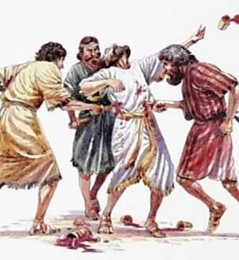
 Christian denominations and sects
Christian denominations and sects
Similarly, today Christianity has many denominations and sects. Denominations agree to the basics of the trinity, and Jesus’ humanity and deity, his virgin birth, death, and resurrection. Sects diverge from these.
Divergence from the core faith has been addressed throughout the New Testament. After the apostles died out, gnostic sects mixed sorcery and pagan ideas into Christianity, often promoting idolatry or sexual immorality.
 Christian sects
Christian sects
Today two main groups claim to be Christian, but are rejected by the church as sects.

The Mormons are known as the Church of Jesus Christ of the Latter-Day Saints. They are very clean living, they say they believe in the Father, Son, and Holy Spirit, but believe that Jesus is a created being, the firstborn of the Father and a celestial mother.
The Jehovah’s Witnesses believe that God (the father) should be worshipped only, but not Jesus, and the Holy Spirit is God’s applied power, rather than an individual.

Both of these contradict
John 1:3 Everything came into existence through him [Jesus]. Not one thing that exists was made without him.
Typical hallmarks of a sect are claims that everyone else has understood it wrong, and “we have the perfect special revelation from God”. Islam is similar in this respect.
 Christian Denominations
Christian Denominations
People often ask, “What’s up with all the different types of churches? There’s Catholics, Anglican, Baptist, Methodist, and heaps of different happy-clappy churches.” The simple answer is that people have differences, and this leads to going separate ways.
 Church history
Church history
Let’s have a quick look at church history.
The church was first overseen by the Apostles until John was the last to die. For a few centuries, the church was overseen by regional representatives. The Roman empire split east and west in 285AD and became Christian in 313AD. In 607AD, Boniface III was the first to be declared Pope. Muslims captured Jerusalem in 637AD. Around 800AD, the Iconoclastic Controversy brought accusations that the use of images in worship in some parts of the church was idolatry. The Great Schism of 1054 finally divided the church into Eastern Orthodox and Catholics to the west.
Around 1517, the Reformation began splitting out protestant churches, who protested Catholic marketeering and wanted the Bible translated into native languages for the common people to understand. Martin Luther was most famous for establishing the German Lutheran Church and mass-printing the Gutenberg Bible. The Anglican Church was established in 1534 by King Henry VIII who didn’t like the pope dictating that he couldn’t divorce and remarry. This eventually resolved protestant kings killing catholic subjects and vice versa, for which Bloody Mary was particularly famous. Then the Baptists and Presbyterian Churches arose without political affiliation. Various great evangelists brought the common people to an intimate relationship with God and established new churches as the old churches got bogged down in religious activity and couldn’t accommodate great men of God who arose in their midst. John Wesley birthed the Methodist Church around 1735 with a focus on holiness, and William Booth founded The Salvation Army around 1865 with a focus on the poor. The churches established since the reformation are commonly called evangelical due to their focus on reaching the common people.
There were various big revivals through this time, but the Azusa St Revival of 1906 in a poor black church in Los Angeles is seen as the birth of Pentecostal churches such as the Elim and Apostolic churches. Pentecostal churches have a focus on a resurgence of the events of Pentecost when 120 disciples were filled with the Holy Spirit and spoke in languages they’d never learned. They also expect to see and practice other supernatural acts like those of the New Testament church. The late 1900’s birthed the New Life and Assemblies of God Pentecostal churches. Hillsong and Bethel follow this trend with a strong focus on worship. Pentecostal churches’ strength is their flexibility to allow the Holy Spirit to lead, but this independence from tradition can lead to problems and controversy.
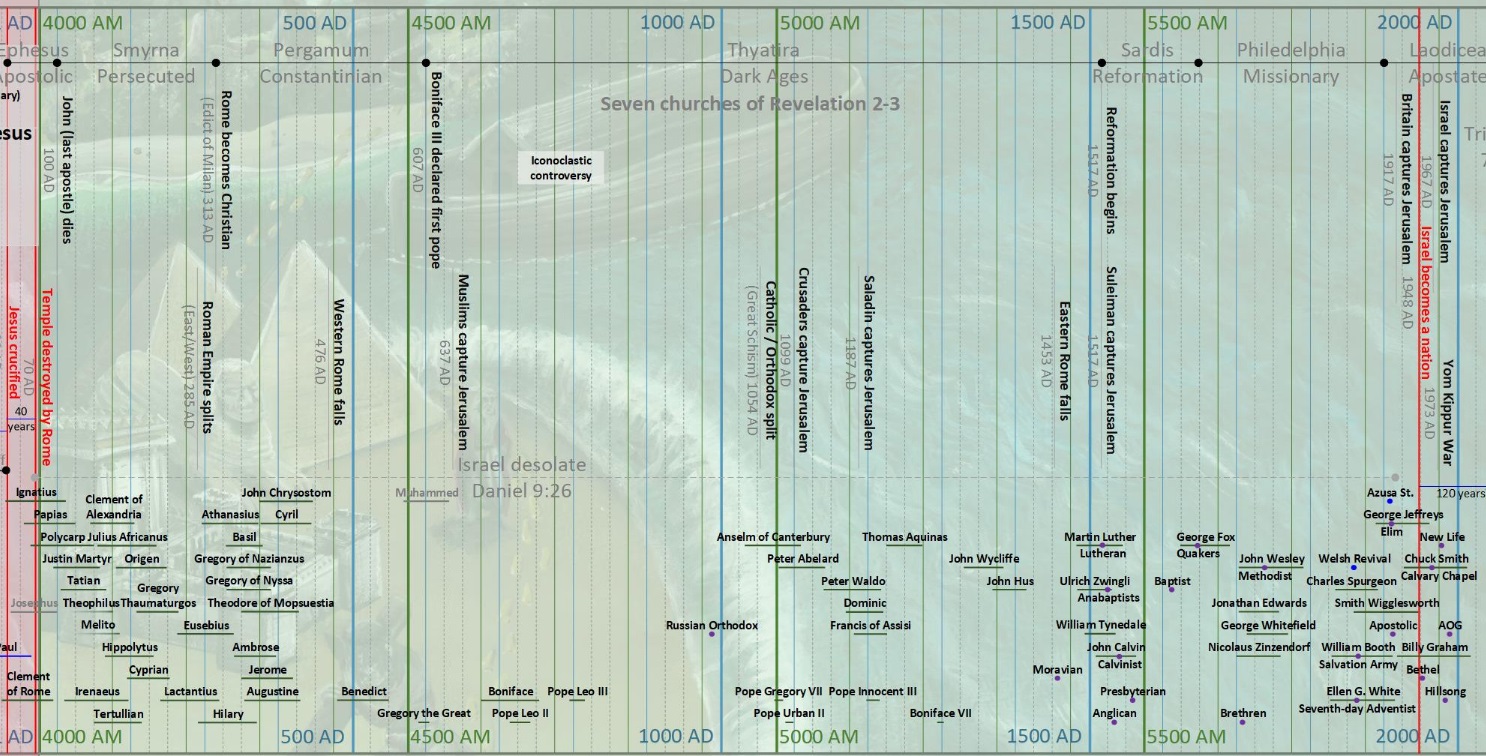
 Different churches
Different churches
Different churches have different focuses, strengths, and weaknesses. Christian expression can be mapped with three focuses: worshipping God, teaching the Bible, and caring for others. I’ve crudely mapped some churches from my perception to show that most don’t have a perfect balance between these. Those that do tend to not be strong in any of these areas. But together the church is perfect.
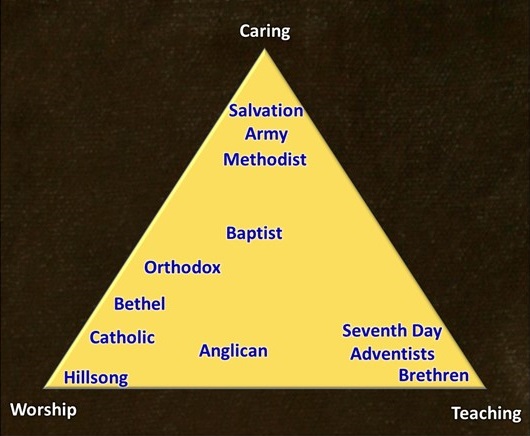
So, while this appears to be a lack of unity and brotherly love, and often this is so, God has provided a body of difference that gathers, accommodates, and nurtures people from all walks of life.
 Blessing
Blessing
Hey God, I thank you that you’ve been with us as we read through this chapter. Thank you that you are Lord over the Sabbath, that you have appointed apostles back then, just as you appoint us today to reach out to others for you. And Lord, I thank you that you have organized the church with many different parts to minister to all parts of the world. Lord I pray that you will bless those who read this chapter and that you'll continue to be with us as we grow closer to you. In Jesus' name. Amen.
Comments
Please Log in to add a comment.